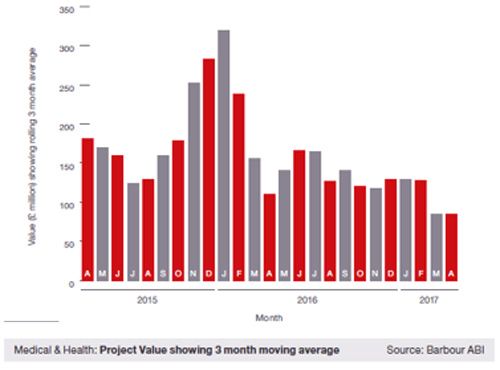 The positive start to the year we have seen for construction came to a halt in April, as pre-election jitters may have got the better of the industry with the value of new contracts commissioned decreasing by 16% when compared to March.
The positive start to the year we have seen for construction came to a halt in April, as pre-election jitters may have got the better of the industry with the value of new contracts commissioned decreasing by 16% when compared to March.
According to the latest edition of the Economic & Construction Market Review from industry analyst Barbour ABI, £5.4bn worth of construction contracts were commissioned in April, lower than in any month across all of 2016, with decreases in contract values across every major sector within the industry, except for infrastructure.
As the General Election campaign gets into full swing, the levels of funding for the NHS have been a major area of focus for the main parties. This month’s report from Barbour ABI highlights the scale of the issues facing healthcare if the construction figures are anything to go by. After a poor year in 2016 for medical & health construction, April certainly showed no sign of an improvement, with figures showing the sector generated only £84m worth of construction contracts. According to Barbour ABI data this was the lowest figure for almost five years and is way below its most recent peak last January of £319m.
In the three months to April the value of medical & healthcare contracts decreased by 21% on the previous three months and were also 41% down on the same period in 2016, highlighting the lower levels of activity we’ve been seeing across the sector in 2017.
The residential sector, which has been steadily supporting the rest of construction for a number of years, saw a construction contract value decrease of 30% in April to £1.7bn, after a six month period of more than £2bn worth of contracts consistently being achieved each month.
Infrastructure, the only sector that grew month-on-month in April, saw some big contract wins such as the £300m Thirlmere to West Cumbria water mains contract and the Avonmouth 33MW waste to energy plant in Bristol valued at £252m.
Commenting on the figures, Michael Dall, Lead Economist at Barbour ABI, said: “It is possible that the timing of Easter this year halted activity in April but this fall is larger than in other years meaning other factors may be at play.
“As the residential sector failed to continue its strong performance in recent months, it only highlights the need for other sectors to pick up the slack, as a strong construction industry cannot rely on one sector to perform each month. Although a comparatively small sector is was interesting that the value of contracts in the medical and healthcare sector fell to a five year low in April. A sector that is largely dependent on capital investment from the government, these figures will ramp up the pressure on all political parties to respond to calls for additional capital spending in the NHS.”



